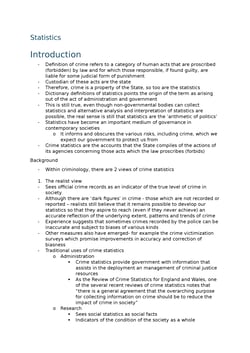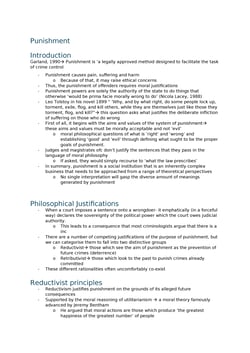Description
- The Classical School (led by Beccaria) views humans as rational, self-interested, and capable of free will. Crime occurs when the rewards outweigh the risks of punishment. Punishment should be swift, certain, and severe to deter crime, with laws reflecting a social consensus of right and wrong.
- The Positivist School argues that criminal behavior is influenced by biological, psychological, and social factors, and individuals have limited control over their actions. This school focuses on scientific, measurable explanations of crime, with theories like biological positivism (Lombroso), psychological positivism (Freud), and sociological positivism (Durkheim’s anomie theory).
Positivist vs. Classical Schools of Criminology
Highlights
- Grade: 4.0
- Institution: University of Maryland (unaffiliated)
- Country: United States
- Level: Masters / PHD



Other
people also bought
4 items
Why Oxbridge Notes?









Frequently asked questions
Our notes are created by top students with excellent grades and approved by lecturers. We also provide previews so you can see the quality before purchasing.
These notes are intended for educational purposes and to help you prepare for exams. We recommend using them as a resource for your studies, not for directly copying into your own work.
Access is provided instantly after the payment is completed. You can immediately download the file and start using the notes.
We’re committed to delivering high-quality academic materials to help you achieve top results. At Oxbridge Notes, your satisfaction is our priority—we stand behind the excellence of our digital goods. If you have any questions or concerns about your purchase, please contact us so we can address them promptly. Due to the intangible and non-returnable nature of digital downloads, refund requests are only considered in exceptional circumstances, such as a failure to provide access to the purchased materials. All decisions regarding refunds remain at the sole discretion of Oxbridge Notes, evaluated on a case-by-case basis. We appreciate your understanding and the opportunity to make things right should an issue arise.
Ask the author a question
Do you have questions that aren't answered by this listing?
Why not get in touch with the seller through us?





